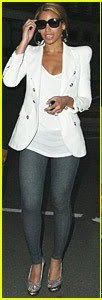One very positive aspect of being natural is that you tend to focus your energy on products/ ingredients you use in your hair, put on your skin and in your body. The effect is healing and has made me ever more conscience of the products I use. Growing up you’re exposed to hair grease and drying shampoo’s but I’m here to let both you naturals and relaxed chica’s and fella’s (if there are any out there!) in on a few secrets about the products out there.
Many commercially available hair care products denoted as being for afro hair use harmful ingredients. The following ingredients are awful for ethnic or African hair, not only stifling our hair’s health, true texture, and hair growth, but also harmful to the body.
1) Isopropyl Alcohol: Dries and Breaks Ethnic hair. It is found in colour rinses, anti-freeze
2) Mineral Oil/ Petrolatum (Hair Grease): It used as a moisturiser in afro hair care products; however, it coats Ethnic hair, actually preventing moisture from getting into the thirsty hair. It is a derivative of crude oil and a cheap industrial grease component. It also prevents the release of toxins from hair and alters the skin respiration by preventing oxygen release. Mmmhmmmm....
3) Polyethylene Glycol (PEG): Strips afro hair of critical moisture. Used as an emulsifier in products, dissolves oils and grease.
4) Propylene Glycol (PG): An active component in many afro hair care products make up, lotions, mouthwashes, and deodorant, PG is the active component of anti-freeze and actually deteriorates the protein and cellular structure of hair. Protein is what your hair needs to thrive. Workers actually use gloves and goggles when dealing with this substance due to its chemical side effects and toxicity.
5) Sodium Lauryl Sulfate (SLS)/ Sodium Laureth Sulfate (SLES) : A cheap foaming and thickening agent that strips hair of moisture and causes skin and scalp irritation. 95% of all hair shampoos contain this ingredient or a derivative. Avoid it completely; TEA lauryl is just as bad, if not worse. Do not be fooled by the use of the word TEA. Hence why i very rarely use shampoo and stick with conditioners.
1) Isopropyl Alcohol: Dries and Breaks Ethnic hair. It is found in colour rinses, anti-freeze
2) Mineral Oil/ Petrolatum (Hair Grease): It used as a moisturiser in afro hair care products; however, it coats Ethnic hair, actually preventing moisture from getting into the thirsty hair. It is a derivative of crude oil and a cheap industrial grease component. It also prevents the release of toxins from hair and alters the skin respiration by preventing oxygen release. Mmmhmmmm....
3) Polyethylene Glycol (PEG): Strips afro hair of critical moisture. Used as an emulsifier in products, dissolves oils and grease.
4) Propylene Glycol (PG): An active component in many afro hair care products make up, lotions, mouthwashes, and deodorant, PG is the active component of anti-freeze and actually deteriorates the protein and cellular structure of hair. Protein is what your hair needs to thrive. Workers actually use gloves and goggles when dealing with this substance due to its chemical side effects and toxicity.
5) Sodium Lauryl Sulfate (SLS)/ Sodium Laureth Sulfate (SLES) : A cheap foaming and thickening agent that strips hair of moisture and causes skin and scalp irritation. 95% of all hair shampoos contain this ingredient or a derivative. Avoid it completely; TEA lauryl is just as bad, if not worse. Do not be fooled by the use of the word TEA. Hence why i very rarely use shampoo and stick with conditioners.
6) Diethanolamine (DEA), Momoethnanolamine (MEA), Triethanolamine (TEA) : Usually listed as an ingredient containing a neutralising compound, i.e. as Cocamide DEA or Lauramide DEA, repeated skin applications of DEA-based detergents are known to form cancer causing nitrates
7) Avoid Hair Colouring, Rinses, and Dyes. Look on the pack of the ingredient label and check for FD & C Colours: Many individuals with afro hair experience scalp irritation due to these. If you have an irritated scalp, your hair will not grow long or remain healthy.
8) Avoid Products with Chemical Preservatives: Nearly all brands of Black and Ethnic Skin and hair care products contain hair and health harmful toxins, especially parabens that are used to extend products’ shelf lives. While these companies make huge profits, it is at the expense of your hair and health being exposed to cancer causing elements, such as formaldehyde or formaldehyde-donors which can irritate the respiratory system, cause skin reactions and trigger heart palpitations.
9) Abandon your typical beauty supply store. Curly or ethnic hair needs natural hair care products because the sulphates, chemicals, alcohols, and silicones in 99% of hair care products have a moisture stripping effect. Ethnic hair needs moisture to grow, become strong, and stay manageable. Without moisture your hair will become dry and damaged. Try Beauty 4 Ashes GodHead ( http://www.discoverb4a.com/ a great all natural) or Tigi BedHead (Tigi Bed Head Superstar Sulfate Free Shampoo 250ml
10) Try to purchase all natural hair care products tailored for your hair type. Visit your local health foods store or find great hair care product for purchase online. The hair care industry is finally seeing the light and making hair care products that truly work for ethnic hair. Beauty 4 Ashes Christian Health & Beauty, a beauty conglomerate, acclaimed internationally, makes 100% natural ethnic hair care products for general hair health and hair growth (www.discoverb4a.com). Their products have received great ratings in the US as well.
So, there you have it, the list of products to steer clear of but in saying all of that my key advice would be to listen to your hair. If you try something that contains one or more of the above (which i have), don’t fret. If your hair enjoys it then it may not be so bad after all but at least you’re enlightened as to what exactly it is.
Peace, Love and Nappyness dudes!
KN












